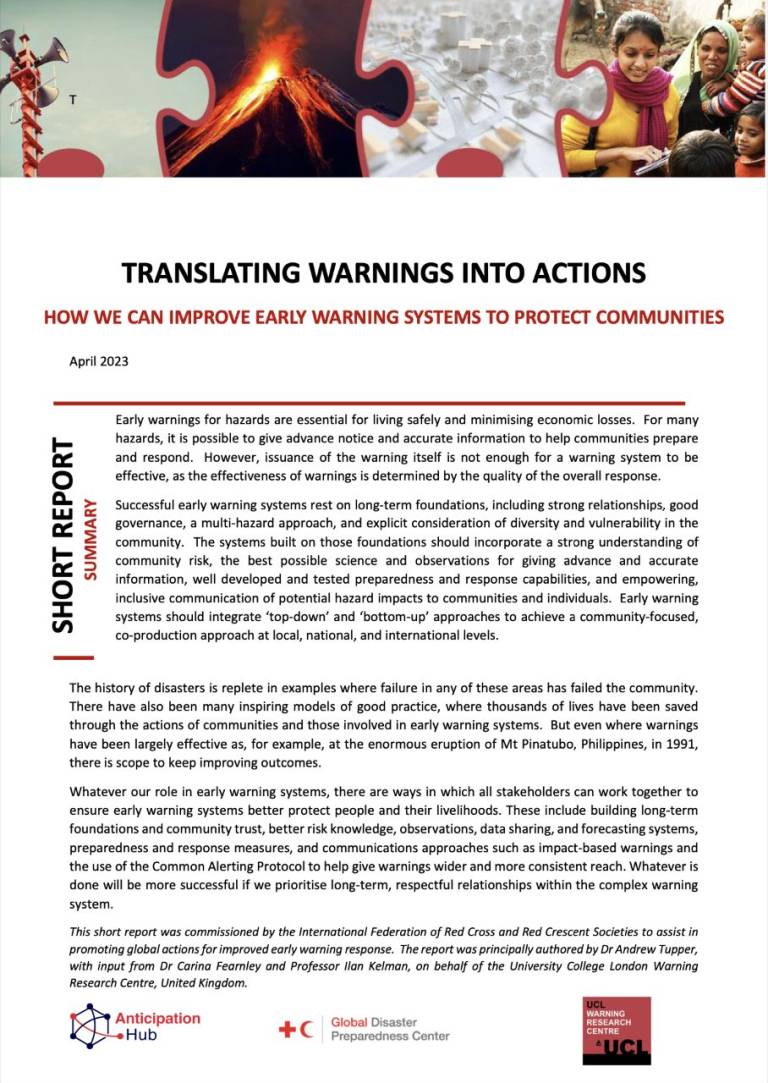Translating Warnings into Action – How We Can Improve Early Warning Systems to Protect Communities
26 April 2023
A new report on Translating Warnings into Actions was commissioned by the IFRC to assist in promoting global actions for improved early warning response. The report was principally authored by Dr Andrew Tupper, with input from WRC's Dr Carina Fearnley and Professor Ilan Kelman.

Early warnings for hazards are essential for living safely and minimizing economic losses. For many hazards, it is possible to give advance notice and accurate information to help communities prepare and respond. However, issuance of the warning itself is not enough for a warning system to be effective, as the effectiveness of warnings is determined by the quality of the overall response.
Whatever our role in early warning systems, there are ways in which all stakeholders can work together to ensure early warning systems better protect people and their livelihoods. These include building long-term foundations and community trust, better risk knowledge, observations, data sharing, and forecasting systems, preparedness and response measures, and communications approaches such as impact-based warnings and the use of the Common Alerting Protocol to help give warnings wider and more consistent reach. Whatever is done will be more successful if we prioritise long-term, respectful relationships within the complex warning system.
The report provides a quick tour of early warning systems, and it is clear there are many good ways to improve the actions taken and to save lives and property. Whether we as a community are helping communicate better, improve warning accuracy, empower communities, or research hazards, we all have parts to play. A strategic, thoughtful approach can help us to make a positive difference.
Our challenge is to understand that nothing we do fixes everything by itself. The improvement of early warning systems, and translating those warnings into actions, will continue to be a collective effort over decades to address what may seem overwhelming levels of complexity. Nevertheless, we have opportunities to work with others to make the whole big picture better, and new opportunities will continue to present themselves. If we work successfully, we can get better information for decision making to the people who need it, earlier, more clearly, and more usefully. We may be enabling a ship’s captain to slow down in bad weather, or helping a family make a decision to evacuate, or assisting relief supplies in getting to the right place more quickly – whatever we do, if done collaboratively, respectfully, and appropriately, will be helping to save lives and protect property. The work is worthwhile.
Full report available for free download: https://preparecenter.org/resource/translating-warnings-into-action-how-we-can-improve-early-warning-systems-to-protect-communities/ and https://www.ucl.ac.uk/sts/sites/sts/files/ucl_report_-_translating_warnings_into_actions_april2023.pdf.
Our sponsors: The International Federation of Red Cross and Red Crescent Societies (IFRC), Global Disaster Preparedness Center (GDPC), and Anticipation Hub
We thank Karin Metz, Nathan Cooper, and Omar Abou-Samra at the Global Disaster Preparedness Center (GDPC) for commissioning this report, and their support and guidance in developing the report, alongside support provided by the Anticipation Hub. We are deeply grateful to have the opportunity to work on this important issue within warnings.
The IFRC is the world’s largest humanitarian network. Their secretariat supports local Red Cross and Red Crescent action in more than 192 countries, bringing together almost 15 million volunteers for the good of humanity. Learn more here https://www.ifrc.org.
The IFRC and American Red Cross established the Global Disaster Preparedness Center (GDPC) as a reference center to support innovation and learning in disaster preparedness. As one of 12 reference centers in the international Red Cross Red Crescent (RCRC) network, the GDPC aims to enhance disaster management–namely preparedness–capacities of Red Cross and Red Crescent national societies through a service-oriented and demand-driven approach to building community resilience. Learn more here: https://preparecenter.org/gdpc-overview/.
The Anticipation Hub is a platform to facilitate knowledge exchange, learning, guidance, and advocacy around anticipatory action both virtually and in-person. The platform is hosted by the German Red Cross in cooperation with the International Federation of Red Cross and Red Crescent Societies (IFRC) and the Red Cross Red Crescent Climate Centre with funding support from Germany's Federal Foreign Office. Learn more here: https://www.anticipation-hub.org.
 Close
Close

